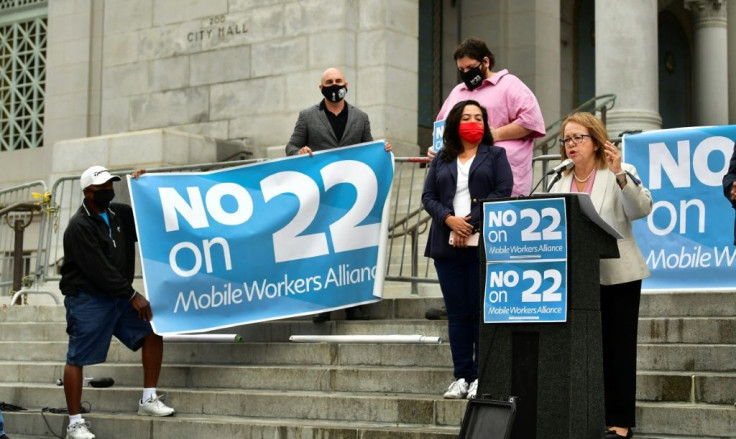Top California Court Rejects Bid To Stop Gig Worker Law
California's top court on Wednesday refused to consider a legal bid to nullify a referendum passed by voters that lets "gig workers" like Uber be treated as contractors.
Justices did not comment on the merits of the case, telling those behind the suit they were free to file it in a lower court.
Drivers for ride-share and meal delivery apps filed the lawsuit directly to the California State Supreme Court in January to derail voter-endorsed labor legislation known as Proposition 22.
"We are disappointed in the Supreme Court's decision not to hear our case, but make no mistake: we are not deterred in our fight to win a livable wage and basic rights," said rideshare driver Hector Castellanos.
"We will consider every option available to protect California workers from attempts by companies like Uber and Lyft to subvert our democracy and attack our rights in order to improve their bottom lines."
Proposition 22 -- passed in November and heavily backed by backed by Uber, Lyft and other app-based, on-demand delivery services -- effectively overturned a state law requiring them to reclassify their drivers and provide employee benefits.
The legal petition filed in January argued the measure is invalid because it usurps the power of state courts and legislators when it comes to worker rights and compensation.
It also contended that the measure "grossly deceived" voters.

The Service Employees International Union joined the drivers in filing the suit.
Defendants in the litigation were the state of California and its commissioner of labor.
Uber driver Jim Pyatt, associated with a coalition supporting the proposition, said he was thankful the Supreme Court declined the litigation.
"We're hopeful this will send a strong signal to special interests to stop trying to undermine the will of voters who overwhelmingly stood with drivers to pass Proposition 22," Pyatt said in a release.
The November vote came after a contentious campaign with labor groups claiming the initiative would erode worker rights and benefits, and with backers arguing for a new, flexible economic model.
The victory for the "gig economy" in California was expected to echo across the US, in a boon for app-based services while igniting fear that big business is rewriting labor laws.
Under the proposition, drivers remain independent contractors but Uber and Lyft are to pay them a number of benefits including a minimum wage, a contribution to healthcare and other forms of insurance. Critics of the measure said it failed to take into account the full costs borne by drivers.
Uber and Lyft claimed most drivers support the contractor model.
© Copyright AFP {{Year}}. All rights reserved.





















